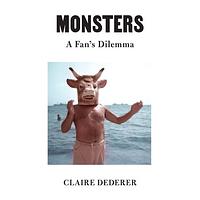You need to sign in or sign up before continuing.
Take a photo of a barcode or cover
Excellent take on the subject, and also well written.
challenging
emotional
informative
reflective
medium-paced
This book started off so well!
When I started this book, I was hoping it would provide a clear-cut answer to a never-ending debate. It didn't.
Instead, it questioned why we react in certain ways when we learn that an artist did, or is doing, horrendous things. The book considered how do we deal with that hurt, the space it takes and whether we can overcome how the news affects our consumption of that's artists' art and biography.
This was the first 160 pages or so. Then, it went completely downhill with overly long questions about what it is to be a monster and whether she fit in the category. And, funnily enough, the ending was clear-cut, which I found counter-intuitive to everything that had been written. That all our reaction boils down to one single issue is a shortcut that undermines the complexity of the feelings, ideas and questions the author asked at the beginning of the book.
When I started this book, I was hoping it would provide a clear-cut answer to a never-ending debate. It didn't.
Instead, it questioned why we react in certain ways when we learn that an artist did, or is doing, horrendous things. The book considered how do we deal with that hurt, the space it takes and whether we can overcome how the news affects our consumption of that's artists' art and biography.
This was the first 160 pages or so. Then, it went completely downhill with overly long questions about what it is to be a monster and whether she fit in the category. And, funnily enough, the ending was clear-cut, which I found counter-intuitive to everything that had been written. That all our reaction boils down to one single issue is a shortcut that undermines the complexity of the feelings, ideas and questions the author asked at the beginning of the book.
Picked this up on a whim and it did not disappoint. Sure, the title question is enticing, but this book is so much more than that. Best described as an incredibly far-reaching evaluation of the digital age, shifting morals, celebrity culture, consumerism, gender, fandom—all communicating with each other, all explained through a feminist lens—everything zeitgeisty.
A perfect pairing to Penance by Eliza Clarke, expanding on many similar themes, and my reading of one definitely informed the other.
Full review coming later, hopefully.
A perfect pairing to Penance by Eliza Clarke, expanding on many similar themes, and my reading of one definitely informed the other.
Full review coming later, hopefully.
challenging
medium-paced
challenging
dark
emotional
reflective
medium-paced
A friend recommended this book (of course later I found out that she hasn’t read it yet!). I’m so glad I read it. No one has expanded upon this question of “what do we do with the art of monstrous artists?” in a way that has been this thorough for me. She gets into all the nooks and crannies of the relationship between art, artist, and audience. She comes at it with the most “good faith” lense that I’ve heard. She doesn’t dismiss any sides of any arguments easily. Most meaningfully to me, she also turns to the question, “what do we do about the terrible people we love?” and has the reader examine the monster within by examining her own monstrousness. Stunning. Bravo and thank you for your thoughtfulness, Ms. Dederer.
It was more of a memoir than an analysis that I was looking for with references to film that I wasn’t too familiar with, so I had a hard time getting into the writing.
I liked the chapters on motherhood but I don’t get how nabokov is problematic — just cus he wrote about a pedophile doesn’t make him one, there’s no evidence to suggest he was in real life
informative
reflective
slow-paced
DNF at 18%. I don’t know what I expected, but this is super boring. Could just be the audiobook narrator.



